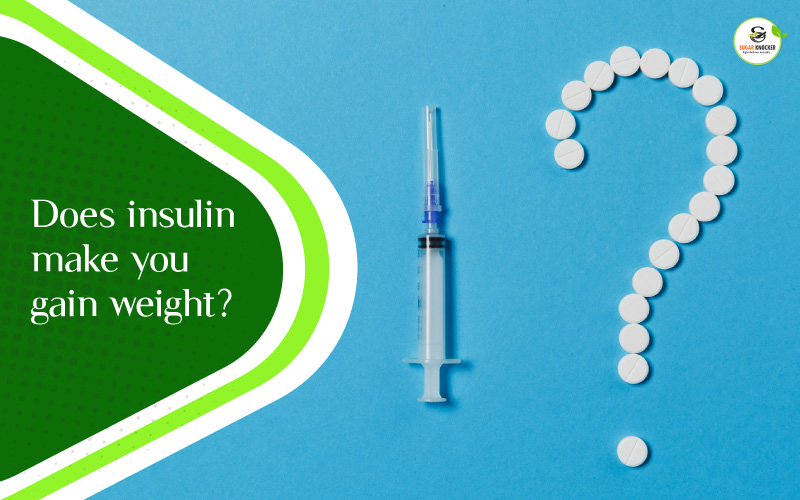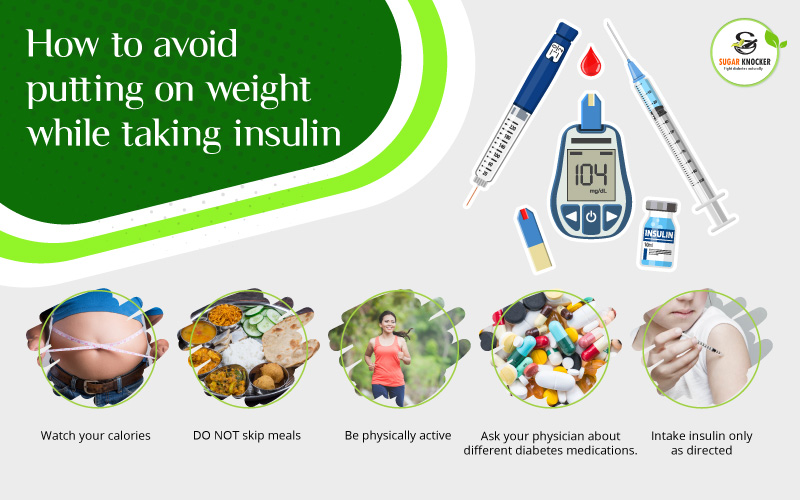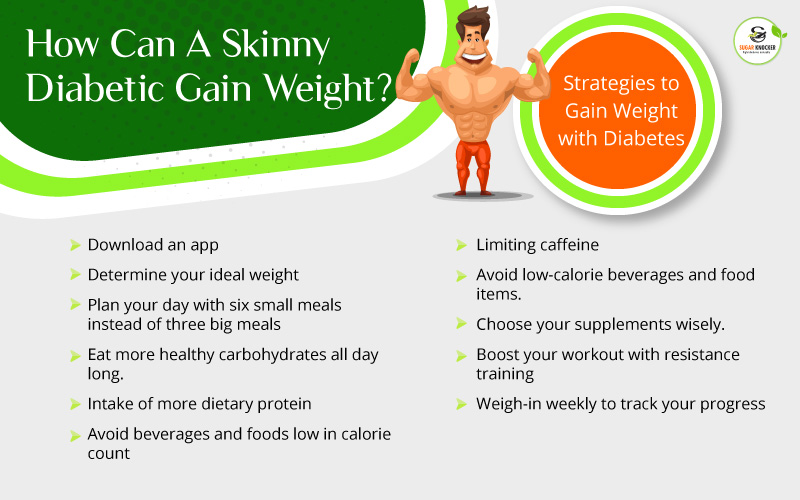
Diabetes is often related to being obese, especially type 2 diabetes. However, it is a myth that every person with diabetes features a high BMI (body mass index). There are various people with diabetes who face difficulty in gaining weight. In fact, unintended and unexplained weight loss is often a symptom of undiagnosed diabetes.
Problems with weight management revolve around insulin hormone, released by the pancreas. People with diabetes find difficulty in producing and transporting excess blood sugar into the cells. This causes your body to burn excessive muscle tissues and fat stores to provide energy to your body. If the blood sugar levels are in constant fluctuation, your body would constantly chip away at your body fat storage, resulting in fat loss.
Listed below is a table of ideal weight as per height.
| Height | Normal weight BMI 19–24 |
Overweight BMI 25–29 |
Obesity BMI 30–39 |
Severe obesity BMI 40+ |
| 4 ft 10 in (58 in) |
41.28 – 52.16 kgs (91 – 115 lb) |
53.98 – 62.6 kgs (119 – 138 lb) |
64.86 – 84.37 kgs (143 – 186 lb) |
86.64 – 117.03 kgs (191 – 258 lb) |
| 4 ft 11 in (59 in) |
42.64 – 53.98 kgs (94 – 119 lb) |
56.25 – 64.86 kgs (124 – 143 lb) |
67.13 – 87.54 kgs (148 – 193 lb) |
89.81 – 121.11 kgs (198 – 267 lb) |
| 5ft (60 in”) |
44 – 55.79 kgs (97 – 123 lb) |
58.06 – 67.13 kgs (128 – 148 lb) |
69.4 – 90.26 kgs (153 – 199 lb) |
92.53 – 125.19 kgs (204 – 276 lb) |
| 5 ft 1 in (61 in) |
45.36 – 57.61 kgs (100 – 127 lb) |
59.87 – 69.4 kgs (132 – 153 lb) |
71.67 – 93.44 kgs (158 – 206 lb) |
95.71 – 129.27 kgs (211 – 285 lb) |
| 5 ft 2 in (62 in) |
47.17 – 59.42 kgs (104 – 131 lb) |
61.69 – 71.67 kgs (136 – 158 lb) |
74.39 – 96.62 kgs (164 – 213 lb) |
98.88 – 133.81 kgs (218 – 295 lb) |
| 5 ft 3 in (63 in) |
48.53 – 61.23 kgs (107 – 135 lb) |
63.96 – 73.94 kgs (141 – 163 lb) |
71.67 – 93.44 kgs (169 – 220 lb) |
95.71 – 129.27 kgs (225 – 304 lb) |
| 5 ft 4 in (64 in) |
49.9 – 63.5 kgs (110 – 140 lb) |
65.77 – 76.66 kgs (145 – 169 lb) |
78.93 – 102.97 kgs (174 – 227 lb) |
105.23 – 142.43 kgs (232 – 314 lb) |
| 5 ft 5 in (65 in) |
51.71 – 65.32 kgs (114 – 144 lb) |
68.04 – 78.93 kgs (150 – 174 lb) |
81.65 – 106.14 kgs (180 – 234 lb) |
108.86 – 146.96 kgs (240 – 324 lb) |
| 5 ft 6 in (66 in) |
53.52 – 67.13 kgs (118 – 148 lb) |
70.31 – 81.19 kgs (155 – 179 lb) |
84.37 – 109.32 kgs (186 – 241 lb) |
112.04 – 151.5 kgs (247 – 334 lb) |
| 5 ft 7 in (67 in) |
54.88 – 69.4 kgs (121 – 153 lb) |
72.12 – 83.91 kgs (159 – 185 lb) |
86.64 – 112.94 kgs (191 – 249 lb) |
115.67 – 156.04 kgs (255 – 344 lb) |
| 5 ft 8 in (68 in) |
56.7 – 71.67 kgs (125 – 158 lb) |
74.39 – 86.18 kgs (164 – 190 lb) |
89.36 – 116.12 kgs (197 – 256 lb) |
118.84 – 160.57 kgs (262 – 354 lb) |
| 5 ft 9 in (69 in) |
58.06 – 73.48 kgs (128 – 162 lb) |
76.66 – 88.9 kgs (169 – 196 lb) |
92.08 – 119.29 kgs (203 – 263 lb) |
122.47 – 165.56 kgs (270 – 365 lb) |
| 5 ft 10 in (70 in) |
59.87 – 75.75 kgs (132 – 167 lb) |
78.93 – 91.63 kgs (174 – 202 lb) |
94.8 – 122.92 kgs (209 – 271 lb) |
126.1 – 170.55 kgs (278 – 376 lb) |
| 5 ft 11 in (71 in) |
61.69 – 78.02 kgs (136 – 172 lb) |
81.19 – 94.35 kgs (179 – 208 lb) |
97.52 – 126.55 kgs (215 – 279 lb) |
129.73 – 175.09 kgs (286 – 386 lb) |
| 6 ft (72 in) |
63.5 – 80.29 kgs (140 – 177 lb) |
83.46 – 96.62 kgs (184 – 213 lb) |
100.24 – 130.18 kgs (221 – 287 lb) |
133.36 – 180.08 kgs (294 – 397 lb) |
| 6 ft 1 in (73 in) |
65.32 – 82.55 kgs (144 – 182 lb) |
85.73 – 99.34 kgs (189 – 219 lb) |
102.97 – 133.81 kgs (227 – 295 lb) |
136.98 – 185.07 kgs (302 – 408 lb) |
| 6 ft 2 in (74 in) |
67.13 – 84.37 kgs (148 – 186 lb) |
88.00 – 102.06 kgs (194 – 225 lb) |
105.69 – 137.44 kgs (233 – 303 lb) |
141.07 – 190.51 kgs (311 – 420 lb) |
| 6 ft 3 in (75 in) |
68.95 – 87.09 kgs (152 – 192 lb) |
90.72 – 105.23 kgs (200 – 232 lb) |
108.86 – 141.07 kgs (240 – 311 lb) |
144.7 – 195.5 kgs (319 – 431 lb) |
| 6 ft 4 in (76 in) |
70.76 – 89.36 kgs (156 – 197 lb) |
92.99 – 107.95 kgs (205 – 238 lb) |
111.58 – 145.15 kgs (246 – 320 lb) |
148.78 – 200.94 kgs (328 – 443 lb) |
The link between insulin and weight gain
[Does Intake of Insulin Increases OR Decreases Your Body Weight?]
Does insulin make you gain weight?

Various researches show that people who take insulin begin putting on weight after a course of time. Now the question is, why does this happen?
The answer to this question is that when a person has diabetes, the body loses its capacity to utilize glucose from food for energy. This means sugar builds up in the body, leading to diabetic complications. One might frequently feel hungry as they do not get enough energy. They might feel thirsty as the body flushes out all the glucose from the bloodstream.
Proper intake of insulin helps you maintain stable body weight. You mustn’t cut down on insulin without the guidance of a doctor, even if you are constantly gaining weight. You can also lose weight if you go off insulin, but you might risk several health complications. Once you begin your treatment, you can gain weight harder.
This process can lead to a very unhealthy weight loss and weight gain pattern. With the process would come various complications like kidney and heart diseases. The good part is that you can maintain a stable weight by utilizing insulin. It means altering your lifestyle and eating style.
[ Everything You Should Know about Insulin Resistance & Insulin Sensitivity ]Avoid putting on weight while taking insulin.

You can prevent yourself from putting on unwanted weight by remaining active on most days of the week and taking in healthy meals every day. The listed below tips can help keep excess weight off:
- Watch your calories – Consuming fewer calories can help prevent weight gain. Stock up your kitchen with whole grains, fruits, and vegetables. Plan for meals with the right amount of fruits, vegetables, starches, fats, and proteins. Experts suggest that a balanced meal comprises one-quarter protein, half non-starchy vegetables, and one-quarter of starch like peas, corn, rice, or others.
Control your food portions and try to skin second servings. Drink water instead of sweetened drinks. You can speak to your doctor or consult a dietician to get strategic meal plans.
- DO NOT skip meals – Do not try to cut down calories by skipping meals. If you skip meals, you tend to make poor and unhealthy food choices for the next dinner as you get too hungry. Also, if you do not adjust your insulin doses, skipping meals can cause your blood sugar level to spike.
- Be physically active - Physical activities burn calories and help lose weight. The Department of Health and Human Services suggests that a reasonable goal for adults is 150 minutes of moderately intense activity. You can opt for walking, water aerobics, gardening, bicycling, etc. It would help if you indulged in muscle-strengthening activities or exercises at least twice a week.
You can speak to your doctor about exercises and activities appropriate for you. Also, ask your doctor how to handle training. Physical activities help you utilize insulin more efficiently; therefore, you might have to cut down on insulin doses depending on the amount of exercise. Your blood glucose levels can fall even after hours of physical activity.
- Ask your physician about different diabetes medications.
Several medications help weight loss and enable your body to reduce the insulin dose. You can ask your doctor for other drugs to indulge in your daily lifestyle. Listed below are some medicines that help to regular blood sugar levels. Let us have a look:
- metformin (Fortamet, Glucophage, others)
- empagliflozin (Jardiance)
- liraglutide (Victoza)
- albiglutide (Tarzeum)
- exenatide (Byetta)
- sitagliptin (Januvia)
- dulaglutide (Trulicity)
- saxagliptin (Onglyza)
- dapagliflozin (Farxiga)
- canagliflozin (Invokana)
- pramlintide (Symlin)
- Intake insulin only as directed - Do not reduce or skip taking your insulin dosage to get rid of excess weight. Although you might lose weight if you reduce your insulin dosage, serious risks are involved. Without sufficient insulin, your blood glucose level might shoot up, and so would your risk of diabetes complications.
How Can A Skinny Diabetic Gain Weight? Strategies to Gain Weight with Diabetes

Food plans for diabetes are inclined towards helping people lose weight, rather than gaining. This makes it difficult to determine how to gain weight healthily.
If you are looking for answers on how can a skinny diabetic gain weight? Continue reading. Listed below are tips and strategies for gaining weight for lean individuals. In addition, you should speak to a dietician or your doctor to set healthy lifestyle goals. Without wasting any time, let us dive into the list:
Download an app
Several apps help you make the right food choices and manage your diabetic condition. You should look for apps that allow you to track your BMI, blood sugar level, and correct food choices. There are various app options available, and you can pick anyone that suits you best.
Determine your ideal weight
If you are willing to gain weight, it is essential to know your current weight and establish a goal of the much you wish to increase. Setting up a weekly weight gain goal will help you chart your eventual progress. It would help to estimate your approximate BMI as per your height. Put your weight and size into a BMI calculator and have an idea of what your ideal weight must be. Your doctor can help you with these numbers and details as well. Your physician can also help determine your ideal daily calorie intake.
Plan your day with six small meals instead of three big meals
Calories consumption is the only way to put on weight. The trick is to consume healthy food every 2 to 3 hours before your body begins to burn stored fat for energy.
Getting used to eating in this manner would require patience and planning. You need not skip taking in meals or going out with family. It just means you must keep a check on what you eat and how you eat, such that you intake nutrition and calorie-dense food as much as possible. You can benefit if you plan your meals for the entire week. Your ideal meal must contain the following:
- Fruits
- Lean protein
- Vegetables
- Polyunsaturated and monosaturated fats
- Whole grains
It would be best if you drank fluids a little before your meals or a little after you are done eating. Try not to intake fluids while eating. This will help you not to get full by just fluids.
What can a sample meal plan look like?
- Breakfast – wholegrain toast, scrambled eggs, turkey with bacon cooked with drizzled olive oil.
- Mid-morning snack – almonds, a fruit like an apple, and cheddar cheese.
- Lunch – wholegrain bread turkey sandwich, an avocado salad with low sugar dressing, and seeds toppings.
- Evening snack – greek yogurt with dried cranberries and walnuts.
- Dinner – quinoa with grilled salmon, cheese sauce, and broccoli.
- Mid-night snack – wholegrain crackers with natural peanut butter.
Eat more healthy carbohydrates all day long.
Try including low glycemic index carbohydrates in your meals to maintain a stable blood glucose level. Including healthy carbs in your day’s six meals can help you healthily gain weight. But, it is essential to keep an eye on the glucose amounts you take in. If you add little fat and protein to every meal and carbs, you can increase your calorie consumption without spiking your blood sugar levels. Some healthy carbs choices are as follows:
- Berries
- Vegetables
- Seeds
- Whole grains
- Nuts
- Legumes
Consume foods rich in healthy polyunsaturated and monounsaturated fats
Opt for healthy fats like sunflower seed oil while cooking whenever you can. Adding a portion of healthy fat to every meal you intake can help you achieve your target weight. Some options for healthy fats are as follows:
- Olive oil
- Nuts
- Avocado
- Fatty fish like mackerel and salmon
- Canola oil
- Seeds
Intake of more dietary protein
Including protein in your daily meals is essential for your muscle mass. Good sources of protein are as follows:
- Beans
- Soy
- Green peas
- Spirulina
- Soy milk
- Oats and oatmeal
- Chia seeds
- Nuts, nut butter, and other seeds
You must speak to your doctor to know what serving is an adequate portion for your protein requirement. They would calculate based on your weight goals and kidney functioning. For instance, if you intake 3 to 4 ounces of protein in a day, you might require to level up to 7 ounces.
Avoid beverages and foods low in calorie count.
To gain weight, you need to consume five hundred calories in a day. If you opt for calorie-dense food items, you can meet your weight goals quickly. But, if you cannot pass on the low-calorie favorites like lettuce and celery, there are some ways to boost their energy and caloric content. If you like the crunchy part of celery, try adding it to a delicious chicken salad. Instead of consuming it plainly, you can fill up a stalk with almond butter or cream cheese. And if you cannot give up lettuce, you should sprinkle seeds, cheese, blue cheese, and avocado slices on top.
Avoiding low-calorie beverages and foods and limiting caffeine
It is suggested to avoid diet food items, including tea and black coffee. Caffeine often acts as an appetite suppressant and masks hunger. If you are trying to put on some pounds and manage your blood glucose levels, a nutrient-dense snack is a better choice to opt for.
Suitable snack choices include the following:
- Apple with peanut butter
- Granola with complete fat greek yogurt
- Walnuts and banana
- Chia seeds and avocado with whole-grain toast
Adding oil, like avocado or olive oil, to your greens and vegetables helps you gain calories even while eating healthful meals.
Avoid low-calorie beverages and food items.
Low-fat foods are a hard no. However, you can spice up your low-calorie food. Processed food items lack nutritional value and contain loads of sugar. Hence, they are a strict no. Everyday processed food items include crackers, frozen delicacies, cookies, and yogurts.
Choose your supplements wisely.
Choosing wise supplements for gaining weight is again a great choice. But, make sure you take supplements after consulting with your doctor. You must select supplements that help build muscle mass.
Boost your workout with resistance training
Resistance training helps build lean muscles using machines and weights and boosts your appetite. You can also indulge in aquatic resistance and work with medicinal balls. Increasing your workouts with weight training does not mean you need to forgo your aerobic activity. Just now, aerobics burn more calories, and you must compensate with your diet.
Weigh-in weekly to track your progress
To know if you are gaining weight and are on the right track, you must weigh yourself. You can modify your eating habits based on the weight you measure every weekend. If you are taking in enough calories, you will eventually gain weight. A target of 1 to 2 pounds every week can be an ideal weight gain goal.
[ How Weight Loss can Reverse TYPE 2 Diabetes? ]Frequently Asked Questions
Does insulin make you gain weight

Insulin intake, a diabetes therapy, causes people to gain weight. People who intake insulin can manage their weight with some lifestyle strategy and a diet. Insulin is a hormone that regulates blood glucose levels in the body. It helps the cells of the body to absorb glucose for energy. Insulin causes people to gain weight when body cells absorb glucose which the body converts into fat.
Insulin helps regulate blood glucose levels and converts energy from food into fat. It helps to break down proteins and fat. During digestion, insulin stimulates fat, muscle, liver cells, etc., to absorb glucose. Cells either use this energy for producing energy or transform it into fat for the long term. Consuming more calories than your body requires leads to excessive glucose levels. If cells fail to remove excess glucose from the body, it gets stored in the tissues as body fat. When a person consumes insulin for diabetes, their body might absorb excess glucose, leading to weight gain. Unattended and untreated diabetes can cause weight loss as the body stops converting food into energy. Taking in insulin resolves the issue. Therefore, people might experience weight gain when they begin taking insulin.
[ 5 Most Important Tips For Diabetic in Managing Weight ]Does metformin cause weight gain?

Metformin and weight gain are closely associated. Metformin is an oral medication that is used in diabetes therapy. It is a drug for diabetes that is not associated with weight gain. This drug has mechanisms that boost modest weight loss. However, metformin does not guarantee results.
How to gain weight with type 2 diabetes

You must keep a healthy weight and have a strong body as you grow old with type 2 diabetes. There are multiple ways to gain weight healthily. Let us look at the ways in the list below:
- Eat meals regularly at smaller intervals
- Boost protein meals in your lifestyle
- Eat meals and foods rich in proteins and energy
- Try taking high protein drinks
- Try indulging in workouts
Conclusion
Although maximum people experience weight gain with diabetes, it might cause weight loss. Alteration in body weight happens because of insulin levels in the body. But, there are several healthy ways to gain and lose weight with diabetes as required. You need to research, consult your doctor, and follow some beneficial lifestyle changes.

